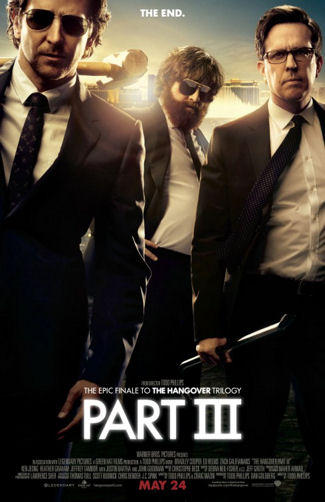The Hangover
Part III
The posters have touted that it's the end of the epic trilogy. But honestly, nobody could possibly have thought that The Hangover was really launching a story so big that it would take three movies to fill.
However, let us give credit to director/writer Todd Phillips and his co-writer, Craig Mazin, for doing the best you might imagine in trying to take dangling plot threads and make them seem purposeful. (Not many from Part II,) The paradoxical flaw and attraction of the plot had been the three who Zach Galiafanis' Alan calls "the Wolfpack." Their adventures kept bordering into the ridiculous, with cartoony violence that led nowhere. That pattern repeated in the tepid sequel, which flailed trying to repeat all the successes of the first. Well, there are consequences.
And that's the strength of this third installment: the consequences. Though it begins with a flurry of black comedy, The Hangover Part III serves better as a thriller, as a group of friends get extorted into chasing down a psychopath. Even though that psychopath is played by the diminutive Ken Jeong, there's a real sense of danger. Leslie Chow wants to have fun, but even admits that it's more fun when other people get hurt.
So the mentally unwell Alan is also finally treated with a measure of seriousness, though he still thinks he's just having a good time. His friends need to take him to a center in Arizona for therapy and perhaps some recovery, but all of it gets derailed by an angry drug lord (John Goodman) Chow crossed four years earlier.
Everyone is set on a deadly collision course that leads them back to Las Vegas, but even the full circle nature feels different here. We really do see it as a matter of life and death, and though a few jokes fly, it's harder to laugh at Galiafinakis' man-child. Even the addition of Melissa McCarthy as a potential love interest for him is low key enough to recognize these are broken people -- and maddeningly unlikeable at times, too.
Bradley Cooper and Ed Helms are both facile with the dramatic side, and, as an actor who can spin between comedy and drama in one line, Goodman stirs things up as the drug kingpin Marshall. Left to their own devices, they're all believable as desperate men.
When the movie tries to shoehorn its comedic reputation, it fails. Director Phillips is a victim of his own success, trying to make something more interesting but falling back on easy gags far too often.
The script wants to allow for growth, but they've got a larger hangover -- a demand for box office success close to the original. Kudos to Phillips for trying to break his pattern, but in the end, he gives in to temptation and falls short of the goal. As a very unlikely trilogy, I suppose we couldn't really have expected anything else from The Hangover Saga.
|






